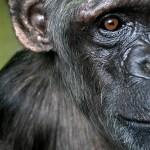Cooperation & Altruism
Author's Note: This post was selected as the topic for the ResearchBlogCast as part of ResearchBlogging.org. Listen to the discussion here.
Could punishing bad behavior be the origin of human cooperation?Humans are one of the most cooperative species on the planet. Our ability to coordinate behavior and work collaboratively with others has allowed us to create the natural world's largest and most densely populated societies, outside of deep sea microbial mats and a few…
A new study shows that chimps sacrifice their own advantage if they earned it unfairly.Image: Owen Booth / Creative Commons
Fairness is the basis of the social contract. As citizens we expect that when we contribute our fair share we should receive our just reward. When social benefits are handed out unequally or when prior agreements are not honored it represents a breach of trust. Based on this, Americans were justifiably outraged when, not just one, but two administrations bailed out the wealthiest institutions in the country while tens of thousands of homeowners (many of whom were…
Image: The Daffodil Cichlid of Lake Tanganyika / Koen Eeckhoudt
In 1888 "Darwin's Bulldog", Thomas Henry Huxley, declared that nature was little more than a "gladiator's show" whereby only "the strongest, the swiftest, and the cunningest live to fight another day." Brutal competition was the only important factor in the natural world, in which a "Hobbesian war of each against all was the normal state of existence." As such, we shouldn't expect cooperation in nature because only strength and selfishness is rewarded by evolution.
But a paper by Dik Heg and colleagues, entitled Helpful Female…
Bonobos retain juvenile traits related to tolerance and cooperation. Image: Vanessa WoodsHow many times as a kid would your parents tell you to grow up and act your age? It turns out that not acting our age may be the very reason why we're so successful as a species.
Brian Hare and colleagues have just released a video (see below) showing a bonobo juvenile voluntarily helping another individual out of their cage to share a few delicious treats. In their study, to be released March 8 in…
Reciprocity is an intrinsic feature of human beings as well as most species of ape. Chimpanzees and bonobos regularly engage in granting gifts of food and expect a return on their generosity (those who don't reciprocate are less likely to receive such gifts in the future) (de Waal and Brosnan 2006). This "tit-for-tat" basis of exchange exists in all human societies and becomes ritualized based on the cultural norms that are present. One of the most well known descriptions of reciprocity among indigenous societies is that of the Kula among the Trobriand Islanders near Papua New Guinea that…
Seed magazine has just posted my review of Frans de Waal's The Age of Empathy: Nature's Lessons for a Kinder Society. I wanted to use this opportunity to thank Nikki, Evan, Bora and everyone else that helped in developing this piece. For posts on related topics please see Misunderstanding Dawkins, The Sacrifice of Admetus, Bonobos "Red in Tooth and Claw", The Evolution of Morality and Laboratory Evidence for the Breakdown of the Selfish Gene.
In a fitting metaphor, the most recent experiment with social darwinism resulted in mass extinction. Former Enron CEO Jeffrey Skilling claimed he was…
Author's Note: This piece is a continuation of my article "Survival of the Kindest" that appeared in Seed magazine.
As an undergraduate in biology and anthropology I read every one of Dawkins' books voraciously and would get into heated debates with my close friends about the Dawkins-Gould rivalry. He was one of the primary voices that taught me to love science and want to devote my life to the pursuit of natural knowledge. So before you read anything else, go out and read Dawkins' work. It's worth your time. This post will still be here when you come back.
The problem that I've found as…
Heracles battles Death for generosity's sake / Frederic Lord Leighton (1869-71)
Whereas great scientific theories stand the test of time when they accurately predict the natural world through repeated empirical trials, great literature transcends the ages when it speaks to universal qualities of human experience. Such inspirational works can also, without the authors realizing at the time, reveal the sublime beauty and tragedy of our evolutionary drama. Few classical authors have tapped into this zeitgeist of biological experience as the Greek tragedian Euripides. The conflict between…
Darwin evicts a Social Darwinist and Eugenicist from his house / Northwestern Univ.
Primatologist Frans de Waal, author of such classic works as Chimpanzee Politics, Peacemaking Among Primates, Good Natured: The Origin of Right and Wrong in Humans and Other Animals, and Bonobo: The Forgotten Ape is now coming out with his new book The Age of Empathy: Nature's Lessons for a Kinder Society. My review of this work will be out early next week to mark the book's national release on September 22. Today and in the next few days I will be reposting pieces I've written over the years on the…
My previous post on a potential problem for the selfish gene theory in explaining cooperative behavior resulted in a fair amount of heated discussion. However, there are quite a few misconceptions regarding the controversy surrounding the selfish gene, group selection, multilevel selection, generalized reciprocity, etc. that need to be clarified. When Richard Dawkins published The Selfish Gene in 1976 it was an instant classic and has been championed for the past three decades as the final answer on how natural selection operates. What has been tremendously useful about the theory, as in…
Primate sociality is linked to brain networks for pair bonds.
Social conservatives are fond of linking morality with monogamy and will be quick to condemn the moral crimes of adulterous felatio while ignoring the moral crimes of cutting social programs for poor mothers. However, in a bizarre twist, research suggests that morality and monogamy are closely intertwined, though it's doubtful many conservatives will champion the reasons why.
In the journal Science Robin Dunbar revisits the question with a unique perspective as to why some species (including humans) succeed so well as members of…

